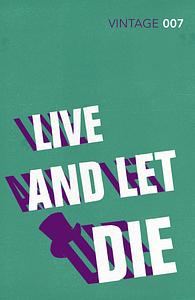Take a photo of a barcode or cover
It was $1.99 on Amazon a couple of weeks ago, and since I'd never read an actual Ian Fleming James Bond novel, I figured it was a reasonable way to broaden my literary horizons. It's by turns horribly racist and fairly progressive, and similarly horribly sexist and...wait, just horribly sexist.
The plot is, by measures of the tropes associated with James Bond films, almost simplistic: uncover and shut down a smuggling operation that funnels money to the Soviets (who don't appear.) A plot that could be easily uncovered by even a mildly effective customs agent, given the nature of the crime. The voodoo subplot that's used heavily in the film is almost completely absent here, and some major plot points of Live and Let Die were scavenged for other Bond films, leading to very little between the novel and the film (this isn't a bad thing--outside of the theme song and actors who went on to better things, the film doesn't have much to recommend it). Nevertheless, as a page-turner, it holds up remarkably well for a fifty-odd year old book.
On a side note, it's interesting to see Fleming's take on American culture in the early 1950s--early in the book Bond makes a meal of a hamburger and a salad with thousand-island dressing, described as "American cooking at its rare best." This makes me want to see him go to a Chili's in a future film.
The plot is, by measures of the tropes associated with James Bond films, almost simplistic: uncover and shut down a smuggling operation that funnels money to the Soviets (who don't appear.) A plot that could be easily uncovered by even a mildly effective customs agent, given the nature of the crime. The voodoo subplot that's used heavily in the film is almost completely absent here, and some major plot points of Live and Let Die were scavenged for other Bond films, leading to very little between the novel and the film (this isn't a bad thing--outside of the theme song and actors who went on to better things, the film doesn't have much to recommend it). Nevertheless, as a page-turner, it holds up remarkably well for a fifty-odd year old book.
On a side note, it's interesting to see Fleming's take on American culture in the early 1950s--early in the book Bond makes a meal of a hamburger and a salad with thousand-island dressing, described as "American cooking at its rare best." This makes me want to see him go to a Chili's in a future film.
adventurous
medium-paced
adventurous
fast-paced
Plot or Character Driven:
Plot
Strong character development:
No
Loveable characters:
Complicated
Diverse cast of characters:
Yes
Flaws of characters a main focus:
No
The second James Bond title continues the trend set up in Casino Royale.
Bond gets a rather unspectacular assignment by M, using his beef with soviet spy organization SMERSH stemming from the finale of the first novel, pursuing a black criminal called Mr. Big, so called because he's well a big fellow, that likes to dabble in voodoo and sells pirate gold to finance SMERSH.
Bond is once more coupled with CIA man Felix Leiter who quickly ,disagrees with something that tried to eat him' (a cruel joke which actually featured on screen in the Bond movie License to Kill).
Of course, the villain quickly has a chat with Bond where 007 meets the alluring and seemingly psychic Solitaire, so called because well she likes to keep to herself away from men. And yes, she's immediately attracted to the rubbish British spy who's most prominent features are his grey-blue eyes and his overall coldness (cold being the most common word to be mentioned over and over again to characterize Bond).
Bond of course is also attracted to the beautiful Solitaire (and apparently forgot about his tragic lover Vesper, even though she's the reason for his beef with SMERSH). They soon go on the run to stop Mr. Big in a showdown full of diving, inventive torture methods, barracudas and sharks and a highly explosive end to Mr. Big, once he has reappeared near the end of the book.
The plot is not too overcomplicated, the action is kept simple, most chapter end with a hook, so it's entertaining read even though it's rather low key compared to the high octane Bond movies. But at least once it matches the silliness (cue the octopus) for which the Roger Moore Bonds were quite famously known for. But beware : don't read this if you want a faithful adaptation of the Bond movie Live and Let Die, the only thing the book and the movie have in common are Mr. Big, Solitaire, Baron Samedi (somewhat). Also be wary of the rather in your face 1950s racial stereotypes of 'Negros' talking a lot of annoying-as-hell pidgin English (d'oh).
Don't be fooled by the 3 star rating, this is a solid 3.5 star read !
Bond gets a rather unspectacular assignment by M, using his beef with soviet spy organization SMERSH stemming from the finale of the first novel, pursuing a black criminal called Mr. Big, so called because he's well a big fellow, that likes to dabble in voodoo and sells pirate gold to finance SMERSH.
Bond is once more coupled with CIA man Felix Leiter who quickly ,disagrees with something that tried to eat him' (a cruel joke which actually featured on screen in the Bond movie License to Kill).
Of course, the villain quickly has a chat with Bond where 007 meets the alluring and seemingly psychic Solitaire, so called because well she likes to keep to herself away from men. And yes, she's immediately attracted to the rubbish British spy who's most prominent features are his grey-blue eyes and his overall coldness (cold being the most common word to be mentioned over and over again to characterize Bond).
Bond of course is also attracted to the beautiful Solitaire (and apparently forgot about his tragic lover Vesper, even though she's the reason for his beef with SMERSH). They soon go on the run to stop Mr. Big in a showdown full of diving, inventive torture methods, barracudas and sharks and a highly explosive end to Mr. Big, once he has reappeared near the end of the book.
The plot is not too overcomplicated, the action is kept simple, most chapter end with a hook, so it's entertaining read even though it's rather low key compared to the high octane Bond movies. But at least once it matches the silliness (cue the octopus) for which the Roger Moore Bonds were quite famously known for. But beware : don't read this if you want a faithful adaptation of the Bond movie Live and Let Die, the only thing the book and the movie have in common are Mr. Big, Solitaire, Baron Samedi (somewhat). Also be wary of the rather in your face 1950s racial stereotypes of 'Negros' talking a lot of annoying-as-hell pidgin English (d'oh).
Don't be fooled by the 3 star rating, this is a solid 3.5 star read !
Well now I understand why they say the James Bond books are racist.
DNF
I couldn't get past the strong racist undercurrent of this book. The "it was a different time" argument does not make it any more palateable or excuse the language and its intent.
Ian Flemming's highly objectionable attitudes toward both women and other races are well documented. As people often state, these were fairly typical of the time. Of course historical context is important but even when factoring this in, Flemming's views feel extreme.
I suppose it comes down to the reader and whether they can take it for what it is and see past it. This is something I have managed to do with the James Bond films but really struggled to here.
That being said, as problematic as some of the films can be, they seem almost progressive in comparison to the source material. This is perhaps down to the time elapsed between them and the attitudes of the film makers.
I couldn't get past the strong racist undercurrent of this book. The "it was a different time" argument does not make it any more palateable or excuse the language and its intent.
Ian Flemming's highly objectionable attitudes toward both women and other races are well documented. As people often state, these were fairly typical of the time. Of course historical context is important but even when factoring this in, Flemming's views feel extreme.
I suppose it comes down to the reader and whether they can take it for what it is and see past it. This is something I have managed to do with the James Bond films but really struggled to here.
That being said, as problematic as some of the films can be, they seem almost progressive in comparison to the source material. This is perhaps down to the time elapsed between them and the attitudes of the film makers.
Fleming has the gift of pacing his books exceptionally well and structuring chapters so that each one ends in a way that makes you want to keep reading. I quite like Mr.Big as a villain but his plan is pretty eh. Love the shark attack stuff and the warehouse fight. Don’t like that he’s saved by pure luck just seconds from death two books in a row (it’s a trope in the movies sure but come on!). Reeeeeally don’t like the way Fleming writes dialogue for the Black characters in this book (other than Mr.Big which is interesting). Shockingly stereotypical even for 1954. Still a good read, more-so than Casino Royale even
This is… fine. But really dated, which is to be expected from a novel from the 50s. Problematic content aside (and oh, is there a plethora of that), the plot is pretty basic and feels pretty superficial. I’ve only read two James Bond novels at this point, and this pales in comparison to Casino Royale.


